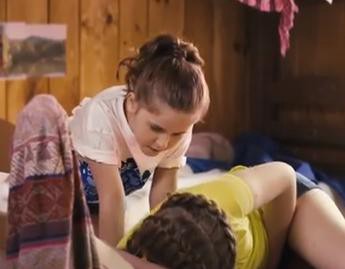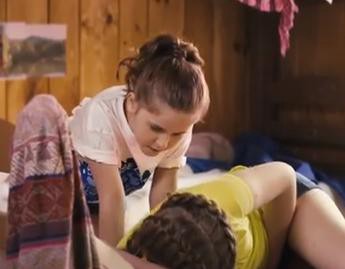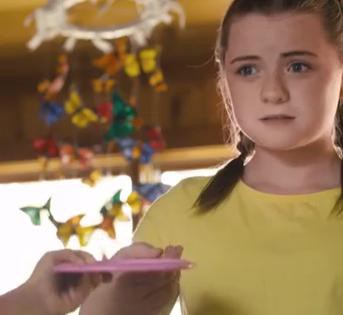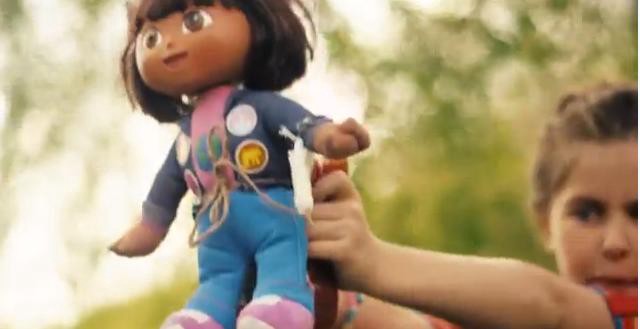Behind the Scenes at Camp Gyno, the “Best Tampon Ad in the History of the World”

Since being posted early Monday morning, the “Camp Gyno” video advertisement for the period-supply subscription service Hello Flo has racked up almost 2 1/2 million views and been called the “funniest period commercial ever” by ABC News, the “best tampon ad in the history of the world” by HuffPo, and the “ad of the year” by Buzzfeed.
The fuss around the video has done a lot to highlight the retrograde stagnation of tampon ads at large, as well as the fact that anything related to woman’s reproduction is an instant, wheel-spinning controversy magnet. You might remember this “Are Tampons Anti-Feminist?” piece from earlier this month (“The problem with invisibility is just that.”), and after watching “Camp Gyno,” editors at the Atlantic questioned the invisibility-friendly business model of Hello Flo as well as suggested that the company’s marketing technique is infantilizing (“Don’t try to make me buy into this hip lifestyle brand represented by a precocious 11-year-old”).
But: “If I felt that women were supposed to be embarrassed to buy tampons, I wouldn’t have called the company Hello Flo,” says Naama Bloom, the founder. “I’m absolutely a feminist, and I want to use this business to create a locus of girls and women being empowered, owning themselves, having lots of information. Still, honestly, when we set out to make the video, aside from wanting to keep the irreverent tone of the brand in our heads, we were not setting out to make a girl-power manifesto. I just wanted to talk about a true thing that happens — to make an ad that women would actually recognize themselves in, to show that the reality of periods is not this hidden, sanitized thing where girls are wearing white pants and riding horses in a meadow.”
Last night I talked to Bloom, as well as the ad’s writers and directors Pete Marquis and Jamie McCelland, about how Camp Gyno came to be.
Did you know from the beginning that you wanted to have an unusual ad campaign?
Naama: Oh, yeah. That was one of the things I knew I could do that a bigger company couldn’t — and I was glad to have that license, and to be able to do something different. And I’m going up against Proctor & Gamble and Kimberly Clarke, and doing this all on personal money, so I knew there was no other way to go. I can’t buy advertising yet.
So I sat down with Pete and said, “Okay, here are the universals.” Every adult remembers the one girl who got her period at school and bled through her pants. It’s this inevitably social thing. Every woman remembers having, or being, that friend who just has all the information — who’s somehow more advanced, and educates everyone else. That was really the genesis of Camp Gyno.
Pete: Basically, with other tampon commercials, you either mute it or change the channel. We were wondering how we could get past that barrier. Women in comedy have taken these issues to different levels recently, and tampon advertising hasn’t really caught up with the times.
I love that the blog on the Hello Flo website links to that incredible Amy Schumer sketch with that group of friends who can’t take each other’s compliments.
Naama: Yeah, it’s amazing. You see it and you’re thrown, because it’s you, and you can’t believe you’ve done this sort of thing for so long. And again, that’s my training in marketing: the things that work are the things that hit the closest to home. It’s just because of the way the media is today that people will interpret something as a big message even if you’re just trying to represent what you’ve seen in your own life.

Tell me about the casting process for Camp Gyno.
Naama: Pete and Jamie really wanted to find a redhead because of the logo, but then Macy just knocked our socks off.
Jamie: When we went into casting we wanted to leave it open as far as the Camp Gyno’s personality because we didn’t have it totally defined yet, but when Macy [McGrail] came in, it was like the Camp Gyno had come to visit. It was like we had conjured her out of the script and into real life. We all looked at each other like, “Is this person real?”
Pete: “And why is she looking at me like that?” She delivered the lines so weirdly, so differently. She blew us away.
What I love about this ad is that it detaches the idea of periods from any sense of adult female acceptability or appeal. Was it really deliberate to use a younger angle?
Naama: That’s actually been pretty controversial. Most of the feedback I’ve gotten has been positive, but some people got a little ruffled about young people using tampons. I even got an email from a girl who wrote, “I’m 11 and my mom won’t let me use tampons, can you send me a box for free?”
I was like, “Oh, no, I can’t, you really need to talk to your mom about this, not me.”
The no-tampons-till-you’re-older thing has always made me uncomfortable. There seems to be a weird subtext about penetration that sexualizes something that is so, so un-sexual to a 10-year-old.
Naama: Yeah. There’s some questionable information out there. I’ve become aware of people who still think you can lose your virginity using tampons. People just don’t know! But Camp Gyno, I really don’t think she’s sexualized at all. To me, she comes off like a cute little kid who’s just discovering life. The issue with this discomfort about young people using tampons — that’s an adult issue, not a children’s issue.
I actually didn’t expect originally to market tampons to all ages of customer. I thought I would offer a tampon box, and a pad-only box that would be like a starter kit for younger girls. And then I spoke to a number of young women — I’m 40 — and I spoke to women who were 20, 21, and they said they started using tampons as soon as they got their period, which wasn’t how it was when I grew up. I was sort of floored! And moms corroborated it, with their experience with their daughters: they said, “Yeah, girls are playing more sports, it’s just a fact now.”
Was it strange to design period jokes for a 10-year-old?

Naama: Luckily Macy’s mom is really cool. She has a great sense of humor, and felt comfortable with the material that we ended up using. And, although Jamie and Pete wrote the ad, I was very closely involved, trying to keep a woman’s perspective in the mix — at some jokes, I was like, “No mother would let their 10-year-old daughter say this. Vagina can’t be the punchline. We can say vagina, but we can’t make fun of vaginas.”
So the Joan of Arc joke was sort of us reaching a balance, and then I added in things like the mirror that Macy hands to her campmate — men would never know to add in a detail like that, but the mirror is such an essential part of the learning process. It had to be in there.
Pete: Yeah, the Joan of Arc joke — we were trying to think of things that we would think are funny, but also that we could imagine a ten-year-old saying, even if she was mostly mimicking, or didn’t fully understand. And while we filmed the video, we figured if Macy was making the whole crew laugh, the joke was fine, it worked.
Jamie: We knew we wanted an edgy video, but also that there was a line. So we just threw a ton of jokes at it, around the line, behind it, in front of it. Naama was a huge help filtering what was right to fit on the edge of what would be funny and also shareable.
Pete: The whole time we were mindful that this product is for women, so we asked friends and coworkers and girlfriends about it, to make sure what we wrote would be funny and not make people cringe.

Anything cringeworthy you can remember that didn’t make the cut?
Jamie: Something cringeworthy for me that did make it in was the ketchup scene.
Pete: I pushed pretty hard for that ketchup scene. That poor, poor Dora doll.
Jamie and Pete — as guys doing a tampon commercial, did you get any weird reactions when you told people what you were up to at work?
Jamie: Nothing overt or overtly sexist, but sometimes this silence that was just a little too long. “We’re doing a video for a tampon delivery service,” and then I could watch people — both boys and girls — just mentally wander away for a few seconds, and then be like, “Oh, oh, okay.”
Naama, did you have a Camp Gyno-like first period experience?
Naama: You know, I don’t even remember my first period. It was me and my mom and my sister living together, so I grew up around tampons and pads and knowing what all that stuff was. I think, when I got my period, I was proud. I never had an “I don’t know what this is!” moment. I was happy, I was glad I wasn’t the last one of my friends to get it. And I didn’t know how to use tampons at first — I think, actually, that I learned at camp.